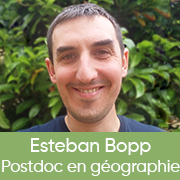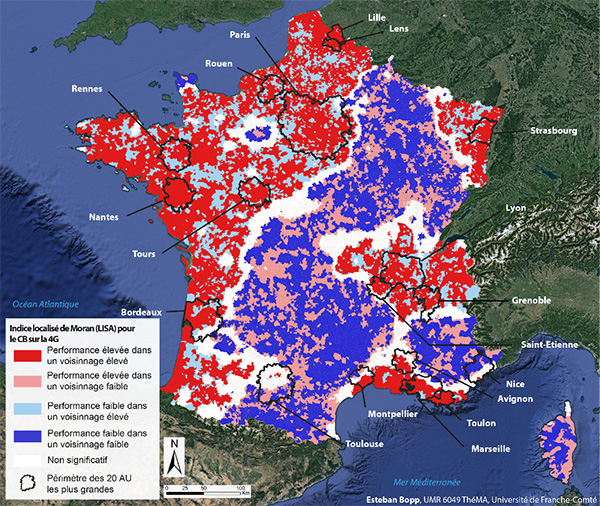[Portrait] Esteban Bopp, postdoctoral fellow in geography
What is your research about?
Since September, I study how people perceive and use public (parks, riverbanks, forests) and private (gardens) urban green spaces. My objective is to model the potential use of green spaces in the cities of Besançon and Dijon.
During my thesis in Avignon (2017-2021), I worked on alerting the population to natural and technological risks. I have estimated the potential of new alert tools that geolocate individuals in real time and that will soon be used in France and Europe.
During these two projects, I mobilised the tools of quantitative geographye: geomatics, spatial analysis and geostatistics.

What are your current scientific activities?
To date, I have published two articles as first author, others are submitted (under review) and others are still in preparation. In parallel, I have been associated as a co-author to other published or submitted articles. I have also been involved in communications (to other researchers, or to actors who might be interested in my work) and popularisation of science. These are other important communication levers. I obtained a "young innovative doctor" grant from the PACA region which will allow me to finance a new one-year post-doctorate and to return to the University of Avignon at the same time.
Why did you choose to work in academic research?
As soon as I set foot in college, I loved it. After a degree in geography and a master's degree in risk management, I had some experience in a local authority in Normandy. But the idea of doing a thesis always appealed to me. I had an opportunity in Avignon and I took it. I found a highly stimulating intellectual environment. I love this principle of asking a question, establishing a methodological protocol to answer it, then analysing the results and checking whether our hypothesis is correct, or whether our question has been asked incorrectly. As a geographer, this scientific approach translates into the spatial study of phenomena. I also love teaching It's a very concrete part of the job. Today, even if the number of positions at the university is very limited, I really aspire to become a teacher-researcher.
What advice would you give to students who want to do research?
I will try to be very synthetic, based on my personal experiences and the many discussions I have had with other PhD students:
- Curiosity is an essential point in my opinion. You have to identify a subject and a way of dealing with it (this point will be clarified with the biblio at the beginning of the thesis). You need to have some idea of what the scientific approach is (questions > hypotheses > methodology protocol > analysis & communication of results).
- Each thesis is different (form, content, approaches, etc.) therefore beware of prejudice (both positive and negative) surrounding the doctorate (funding, workload, working conditions, student/supervisor relationship, etc.).
- Research is a thankless activity. The questioning is permanent and wearing over the long term. Human relations are not always easy.
- Finding a tenured position in research is difficult: a certain number of "boxes" (publication, colloquia, collaborations, teaching, etc.) must be ticked during the thesis in order to hope to find a position afterwards.
- It is possible to stop a thesis along the way: it remains a very enriching experience and you have the right to make mistakes and change your mind.
What object or image from your business best illustrates you?

This figure illustrates the spatial inequality that would result from the use of Cell Broadcast (an alert technology that allows messages to be broadcast to people's mobile phones) throughout mainland France.
Here, I performed a measure of the spatial autocorrelation (correlation in space of a phenomenon) of the Cell Broadcast efficiency (rate of alertable individuals). The use of a key tool of spatial analysis (autocorrelation) highlights an important fracture in the performance of Cell Broadcast in France (rural-mountain/urban-littoral).
However, this divide must be put into perspective with the existence of territories with high Cell Broadcast performance in rural/mountainous areas (light red) and territories with low performance in urban/littoral areas (light blue).
UMR ESPACE (Avignon University) and UMR ThéMA (University of Franche-Comté)
Esteban Bopp is a post-doctoral fellow in l'UMR ThéMA Theorising and Modelling for Development (University of Franche-Comté).
He defended his thesis at Avignon University, under the supervision of Johnny Douvinet of the University of Avignon;UMR ESPACE Study of the Structures and Processes of Adaptation and Change in Space.
MidiSciences - 30/01/2020
"The challenges of alerting the population to risks in France in the digital age: a spatial approach
The portraits
Updated on 22 December 2022